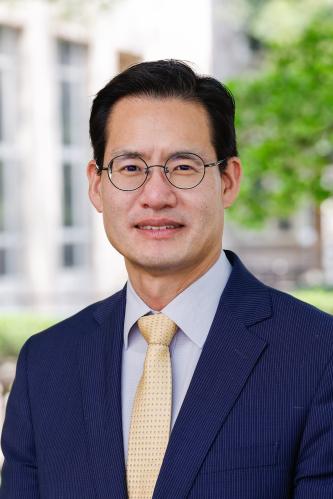The relative steadiness of Korea-Japan relations to date reflects how profoundly the geopolitical environment has changed.
Brookings Affiliation
Research Areas
Additional Expertise
- Alliance politics
- Asian security
- Civil society
- Indo-Pacific strategy
- Overseas basing strategy
- Social and transnational movements
- South Korean foreign policy
Andrew Yeo is a senior fellow and the SK-Korea Foundation Chair at the Brookings Institution’s Center for Asia Policy Studies. He is also a professor of politics at The Catholic University of America in Washington, D.C.
Yeo is the author or editor of six books including his most recent co-edited book, “Great Power Competition and Overseas Bases: Chinese, Russian, and American Force Posture in the 21st Century” (Brookings Institution Press, 2024). He is also the author or co-editor of five other books including “Asia’s Regional Architecture: Alliances and Institutions in the Pacific Century” (Stanford University Press, 2019); “State, Society, and Markets in North Korea” (Cambridge University Press 2021); “North Korean Human Rights: Activists and Networks” (Cambridge University Press 2018); “Activists, Alliances, and Anti-U.S. Base Protests” (Cambridge University Press 2011); and “Living in an Age of Mistrust: An Interdisciplinary Study of Declining Trust in Contemporary Society and Politics and How to Get it Back” (Routledge Press 2017).
Yeo is currently working on a project that examines the role of narratives in the formation of grand strategy, particularly in the context of South Korea. His research also covers U.S. alliances in Asia, Asia’s regional architecture and institutional change, U.S. grand strategy and force posture, South Korean foreign policy, U.S.-North Korea relations, and North Korean human rights. As a scholar working at the intersection of international relations and comparative politics, he also has an interest in studying civil society, social and transnational movements, and democratization.
Yeo is a firm believer in connecting academic theory with policy relevant research. As an expert on Asia, U.S.-South Korea relations, and North Korea, he has written reports, given talks, participated in conferences and roundtable discussions, and collaborated on projects with several research and academic institutions in the United States and in Asia. Yeo’s scholarly publications can be found in International Studies Quarterly, European Journal of International Relations, Perspectives on Politics, Comparative Politics, Comparative Strategy, Journal of East Asian Studies, Asian Studies Review, and International Relations of the Asia-Pacific among others. His other writings have appeared in the Washington Post, Foreign Affairs, Foreign Policy, The Hill, The National Interest, and The Diplomat. He has offered commentary in a variety of media outlets including CNN, NBC, Fox News, MSNBC, BBC, NPR, Channel News Asia, Arirang TV, Voice of America, Radio Free Asia, Wall Street Journal, The Washington Post, The New York Times, The Economist, South China Morning Post, Al Jazeera, Japan Times, Korea Times, Chosun Ilbo, Hankyoreh, Kyunghyang Shinmun, and Joongang Ilbo.
Yeo is a member of the National Committee on North Korea. He is part of the first cohort of the Mansfield-Luce Asia Scholars Network (2020-21) and the first cohort of the Korea Foundation-Mansfield Foundation Scholar-Policy Nexus (2013-14). He is a two-time recipient of a U.S. Fulbright scholar award conducting research as a senior scholar in the Philippines in 2020, and as a graduate student in South Korea in 2005-06. Yeo received his doctorate in government from Cornell University, and bachelor’s in psychology and international studies from Northwestern University.
Affiliations:
- American Political Science Association (APSA), member
- Association of Korean Political Studies, member
- Georgetown Journal of Asian Affairs, editorial board member
- International Studies Association (ISA), member
- International Journal of Korean Unification Studies, advisory board member
- ISA International Security Studies Section, governing council member
- Korean-American Student Conference, national advisory committee
- National Committee for North Korea, member
- Security Studies, editorial board member
-
Current Positions
- Professor of Politics, The Catholic University of America
-
Past Positions
- Director, Asian Studies Program, The Catholic University of America
- Senior Fellow, The Maureen and Mike Mansfield Foundation (2020-2021)
- Fulbright Visiting Research Fellow, University of the Philippines, Diliman (2020)
- Assistant and Associate Professor of Politics, The Catholic University of America (2008-2020)
- Visiting Professor, International Summer Institute, Seoul National University (2018)
-
Education
- Ph.D., Cornell University, 2008
- M.A., Cornell University, 2005
- B.A., Northwestern University, 2000
Media Coverage
Andrew Yeo joined CSIS’ The Capital Cable to breakdown what to expect from the Korean Peninsula in 2026 and regional relations with China and Russia.
Much of his [South Korean President Lee Jae-myung] first six months focused a lot on issues that were somewhat easier to forge a broader political consensus around…I suspect we will see..."
The modernization and expansion of the Yongbyon nuclear facility underscore just how far we’ve moved from the era of DPRK summitry during Trump’s first administration…Yongbyon is also..."
[The Chinese sanctions on Hanwha Ocean subsidiaries] was a wake-up call …That’s a pressure point that I don’t think South Korea expected.
Andrew Yeo joined “The Impossible State” podcast to preview the upcoming U.S.-South Korea summit and discuss the future of inter-Korean engagement.
I think China is still mindful of where the US may sit, and they’re also trying to improve relations with the United States…But in terms of being a useful partner to the US and pressing..."
Backlash is already brewing…South Korean companies, particularly those in the EV battery and auto industry, may be reluctant to pursue further investments in the US.
Allies are receiving mixed signals. The South Korea case has made countries like Japan and even EU nations nervous. The Trump administration probably wanted shock value to teach other..."
There probably wasn’t any coordination in terms of how to address the part where we want to revive American manufacturing, and get foreign investors to invest billions in the U.S., but..."
